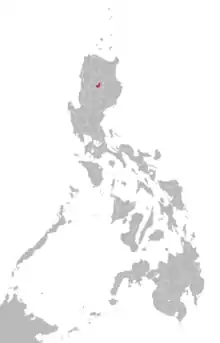Balangao language
Balangao or Balangaw (also called Balangao Bontoc) is an Austronesian language spoken in northern Luzon, Philippines. It is spoken in the central area of Mountain Province, and into Tanudan municipality of Kalinga Province.
| Balangao | |
|---|---|
| Balangaw, Balangao Bontoc | |
| Native to | Philippines |
| Region | Luzon |
| Ethnicity | Balangao people |
Native speakers | 21,000 (2000)[1] |
Austronesian
| |
| Language codes | |
| ISO 639-3 | blw |
| Glottolog | bala1310 |
 Area where Balangao is spoken according to Ethnologue | |
Phonology
Balangao has the following phoneme inventory:[2]
| Front | Central | Back | |
|---|---|---|---|
| Close | i | ɨ | u |
| Mid | e | o | |
| Open | a |
The central vowels /a/ and /ɨ/ each have a lowered and a raised allophone, viz. [a]~[ə] for /a/, and [ə]~[ɨ] for /ɨ/.
| Bilabial | Alveolar | Palatal | Velar | Glottal | ||
|---|---|---|---|---|---|---|
| Nasal | m | n | ŋ | |||
| Plosive | voiceless | p | t | k | ʔ | |
| voiced | b | d | ɡ | |||
| Fricative | s | h | ||||
| Approximant | l | j | w | |||
The voiced stops /b/, /d/ and /g/ have voiceless allophones [f], [t͡ʃ], [kʰ] in syllable position.
References
- Balangao at Ethnologue (18th ed., 2015)
- Shetler, Joanne (1976). Notes on Balangao grammar. Language Data: Asian-Pacific Series No. 9. Huntington Beach: Summer Institute of Linguistics.
This article is issued from Wikipedia. The text is licensed under Creative Commons - Attribution - Sharealike. Additional terms may apply for the media files.